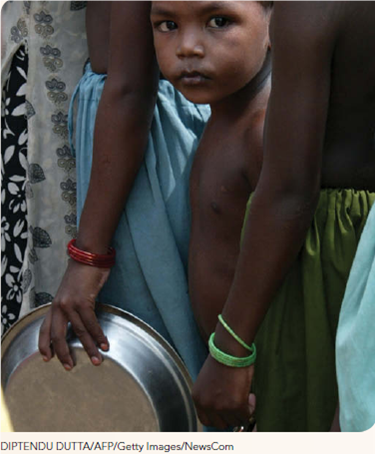
Management 13th Edition by John Schermerhorn,Daniel Bachrach
Edition 13ISBN: 978-1118841518
Management 13th Edition by John Schermerhorn,Daniel Bachrach
Edition 13ISBN: 978-1118841518 Exercise 22
KNOW RIGHT FROM WRONG
"We aren't really interested in the more-aid-less-aid debate. We're interested in seeing what works and what doesn't."
What Really Works When Fighting World Poverty

D eveloping countries send $1001 billion in aid to poor countries; private foundations and charities spend $701 billion more fighting poverty and its effects around the world. Their plans and goals are praiseworthy, but is all of that money being well spent, and to the greatest effect
Not all of it is being well spent, that's for sure. That's one of the problems being tackled by the Poverty Action Lab at the Massachusetts Institute of Technology. The director, Abhijit Banerjee, a development economist, says: "We aren't really interested in the more-aid-less-aid debate. We're interested in seeing what works and what doesn't." The lab criticizes "feel-good" approaches and pushes for rigorous evaluations of poverty-fighting programs using scientific methods. Here's an example.
The Indian antipoverty group Seva Mandir was concerned about teacher absenteeism and low performance by rural school children. Its original plan was to pay extra tutors to assist teachers in 120 rural schools. The Poverty Lab Plan suggested paying extra tutors in 60 schools, making no changes in the other 60, and then comparing outcomes to see if the plan worked. An evaluation of results showed no difference in children's performance, even with the higher costs of extra tutors.
A new plan was made to buy cameras for 60 teachers, have them take time/date-stamped photos with children at the start and end of each school day, and have the photos analyzed each month. Teachers would receive bonuses or fines based on their absenteeism and student performance. Again, no changes were made in the other 60 schools. Evaluation revealed that teacher absenteeism was 20% lower and student performance was signifi- cantly higher in the camera schools. With the Poverty Lab's help, Seva Mandir concluded that investing in closely monitored pay incentives could improve teacher attendance in rural schools.
WHAT DO YOU THINK
Look around your organization and at cases reported in the news. How often do we draw conclusions that "plans are working" based on feel-good evaluations or anecdotal reports rather than solid scientific evaluations What are the consequences at work and in society when plans are implemented at great cost, but without systematic, defensible systems for evaluation Even if the objectives of a project are honorable, what ethical issues arise in situations where it isn't clear that the project is having the intended benefit
"We aren't really interested in the more-aid-less-aid debate. We're interested in seeing what works and what doesn't."
What Really Works When Fighting World Poverty

D eveloping countries send $1001 billion in aid to poor countries; private foundations and charities spend $701 billion more fighting poverty and its effects around the world. Their plans and goals are praiseworthy, but is all of that money being well spent, and to the greatest effect
Not all of it is being well spent, that's for sure. That's one of the problems being tackled by the Poverty Action Lab at the Massachusetts Institute of Technology. The director, Abhijit Banerjee, a development economist, says: "We aren't really interested in the more-aid-less-aid debate. We're interested in seeing what works and what doesn't." The lab criticizes "feel-good" approaches and pushes for rigorous evaluations of poverty-fighting programs using scientific methods. Here's an example.
The Indian antipoverty group Seva Mandir was concerned about teacher absenteeism and low performance by rural school children. Its original plan was to pay extra tutors to assist teachers in 120 rural schools. The Poverty Lab Plan suggested paying extra tutors in 60 schools, making no changes in the other 60, and then comparing outcomes to see if the plan worked. An evaluation of results showed no difference in children's performance, even with the higher costs of extra tutors.
A new plan was made to buy cameras for 60 teachers, have them take time/date-stamped photos with children at the start and end of each school day, and have the photos analyzed each month. Teachers would receive bonuses or fines based on their absenteeism and student performance. Again, no changes were made in the other 60 schools. Evaluation revealed that teacher absenteeism was 20% lower and student performance was signifi- cantly higher in the camera schools. With the Poverty Lab's help, Seva Mandir concluded that investing in closely monitored pay incentives could improve teacher attendance in rural schools.
WHAT DO YOU THINK
Look around your organization and at cases reported in the news. How often do we draw conclusions that "plans are working" based on feel-good evaluations or anecdotal reports rather than solid scientific evaluations What are the consequences at work and in society when plans are implemented at great cost, but without systematic, defensible systems for evaluation Even if the objectives of a project are honorable, what ethical issues arise in situations where it isn't clear that the project is having the intended benefit
Explanation
Several developing countries, foundation...
Management 13th Edition by John Schermerhorn,Daniel Bachrach
Why don’t you like this exercise?
Other Minimum 8 character and maximum 255 character
Character 255


